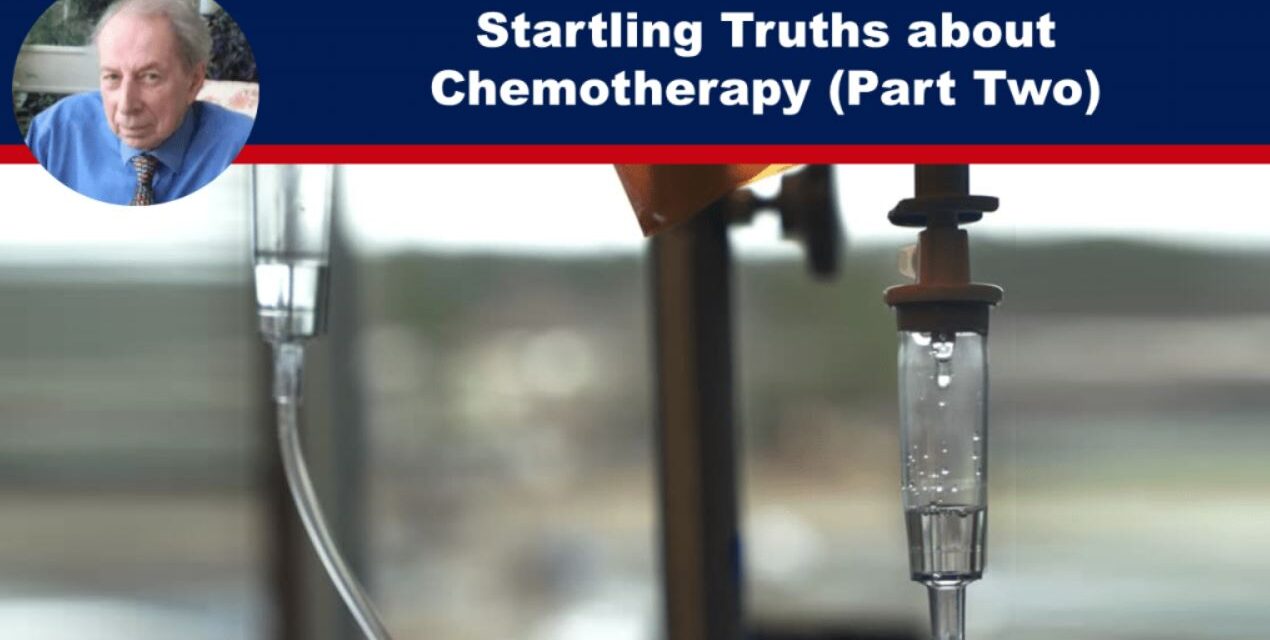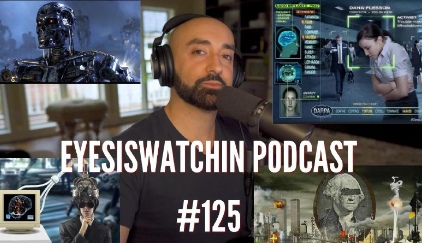In the second part of startling truths about chemotherapy, Dr. Vernon Coleman highlights that chemotherapy is often recommended because of financial interests, with drug companies, cancer charities and doctors profiting from it, despite its potentially lethal side effects.
The serious side effects of chemotherapy are admitted by the American Society of Clinical Oncologists, which advises doctors to limit chemotherapy and use it only for relatively healthy patients as it can weaken and even kill patients, especially those who are already in poor health. This is ironic as many patients with cancer simply aren’t fit enough to be treated with chemotherapy.
You can read Part One HERE.
Drug companies, cancer charities and doctors recommend chemotherapy because there is big money in it. The least forgivable of these are the cancer charities which exist to protect people but which seem to me to be ruthless exploiters of patients.
As always, the medical literature is confusing but in the Annals of Oncology I found this: “The upfront use of chemotherapy does not seem to influence the overall outcome of the disease.”
Most doctors won’t tell you this, or even admit it to themselves, but cancer drugs are killing up to 50% of patients in some hospitals. A study by Public Health England and Cancer Research UK, which was published in The Lancet, found that 2.4% of breast cancer patients die within a month of starting chemotherapy. The figures are even worse for patients with lung cancer, where 8.4% of patients die within a month when treated with chemotherapy. When patients die that quickly, I feel that it is safe to assume that they were killed by the treatment, not the disease. At one hospital, the death rate for patients with lung cancer treated with chemotherapy was reported at over 50%. The one-month mortality rate in one group of teaching hospitals was 28% for patients receiving palliative care for lung cancer. One in five breast cancer patients in another group of hospitals died from their treatment. Naturally, all the hospitals which took part in the study insisted that chemotherapy prescribing was being done safely. If we accept this, then we must also question the validity of chemotherapy. The study showed that the figures are particularly bad for patients who are in poor general health when they start treatment. The problem, of course, is that chemotherapy does not differentiate between healthy cells and cancerous cells, and the cell-destroying properties of chemotherapy can be lethal. One senior oncologist said: “I think it’s important to make patients aware that there are potentially life-threatening downsides to chemotherapy. And doctors should be more careful about who they treat with chemotherapy.” Sadly, I fear that most doctors do not share full details of the risks associated with chemotherapy, and a good number of patients take chemotherapy thinking that the only downside will be a short-term loss of their hair. This, in truth, is the least of the problems associated with these drugs.
A study published in JAMA Oncology studied the use of chemotherapy among 312 terminally ill cancer patients. All 312 patients had been given no more than six months to live by their doctors and all had at least one, and in some cases, multiple rounds of chemotherapy, which had failed. Their tumours had, despite the chemotherapy, spread to other parts of their body. And yet half of these patients were on chemotherapy, despite its obvious ineffectiveness. The analysis published in JAMA Oncology showed that these patients were worse off than if they hadn’t had treatment. Their quality of life was less than it would have been without chemotherapy. The patients on chemotherapy were less able to walk, take care of themselves and stay active than the patients not taking chemotherapy. Most surprising was the fact that the patients who were feeling the best at the start of their chemotherapy were the ones who ended up feeling the worst; they were the ones who suffered the most. The chemotherapy consequences for those patients had been to make their lives worse without any benefit.
Other studies have shown the same thing. Chemotherapy in terminally ill patients is essentially ineffective. Any tumour shrinkage (a rare occurrence) was not linked to a longer life.
As a result of all this research, the American Society of Clinical Oncologists has advised doctors to be more judicious with their chemotherapy use in terminal patients. The group’s guidelines recommend limiting the use of chemotherapy to relatively healthy patients who can withstand the toxic effects and, hopefully, overcome the awful side effects.
The sad thing is that many cancer patients still believe that more and more rounds of chemotherapy will be of benefit to them. The truth is that patients with end-stage cancer who are still relatively healthy will be made weaker by chemotherapy and will spend much of their remaining time travelling to and from hospital. It really is vital that patients be informed about the real risks of chemotherapy and that they should be involved in making decisions about their treatment. Chemotherapy is so toxic that the chances of a patient surviving treatment depend a good deal on their age and general well-being. Patients who are seriously ill are, it seems, more likely to die as a result of chemotherapy. (There is no little irony in the fact that many patients with cancer simply aren’t fit enough to be treated with chemotherapy. And, of course, the people who don’t have cancer don’t need it.)
In America, huge numbers of patients are forced to undergo chemotherapy at the State’s behest, even when patients and relatives object. So, for example, a 17-year-old diagnosed with Hodgkin lymphoma decided to seek alternatives to chemotherapy but her doctors were so convinced by the Big Pharma propaganda that they contacted family services who kidnapped the young adult and had her placed in foster care. She was only allowed to go home once she had agreed to have the chemotherapy, though she ran away. The Supreme Court in the US ruled that the State was in the right and had the authority to kidnap the patient, force her into treatment against her will and deny her contact with her family.
Next, think about this.
In the UK, the National Health Service publishes comprehensive guidelines on what must be done if chemotherapy drugs are spilt. There are crisis emergency procedures to be followed if chemotherapy drugs fall on the floor. And yet, these drugs are put into people’s bodies. And residues of these dangerous chemicals are excreted in urine and then end up in the drinking water supply. (I explained several decades ago in my books ‘Meat causes Cancer’ and ‘Superbody’ how prescription drug residues end up in our drinking water.)
It is hardly surprising that many patients being treated with chemotherapy report that their quality of life has plummeted.
The standard oncology approach to cancer is to give chemotherapy and then wait and see if the cancer returns. If it does, then more chemotherapy is prescribed. The tragedy is that for so many patients, chemotherapy will do more harm than good. Astonishingly, a quarter of cancer patients die of heart attacks – often triggered by deep vein thrombosis and by emboli and brought on by the physical stress of chemotherapy. But these deaths are not included in the official statistics – either for cancer or, just as importantly, for chemotherapy. It is no exaggeration to say that the establishment fiddles the figures to suit its own largely commercial ends – extolling the virtues of drug company products at every opportunity and never failing to throw doubt on any remedy which might threaten the huge cancer industry.
Here’s another thing you might not know.
During the lockdowns and concerns about covid-19, patients who were on chemotherapy were taken off their treatment. They were told that since their treatment would affect their immune systems, they would be more vulnerable to the coronavirus. That’s an important admission because the one thing we know for certain is that a healthy immune system is vital for fighting cancer.
Doctors probably won’t tell you any of this but they won’t deny it because it is all true.
The bottom line is that treatments described in clinical trials, paid for by drug companies and generally reviewed by doctors with drug company links, and then published in medical journals which accept huge amounts of drug company advertising, are the only treatments the medical profession accepts. There is much talk about “peer review” trials but all this means is that another doctor or two, with drug company links, will have looked at the paper and given it their approval.
The word “corrupt” doesn’t come close to describing this whole incestuous system.
Anyone who wants to have chemotherapy should have it. I’m not trying to dissuade anyone from using whatever drugs they believe might help them. I’m only interested in providing unbiased, independent information which might help patients make the right decision for themselves.
But too often, I fear, patients beg for treatment, completely understandably, because they want something to be done and because they have been misled by the drug company inspired, and paid for, hype about chemotherapy. And doctors provide that treatment, even though a little research would tell them that they may be doing more harm than good. There are a very few cancers which can be treated well with chemotherapy – but they are very few, and they are unfairly and unreasonably promoted as success stories by the drug companies and their shills.
The thing that is forgotten or ignored is that chemotherapy can badly damage the patient’s body’s own protections – and with some patients may, therefore, do infinitely more harm than good.
Every patient should decide for themselves – and discuss with their doctors the evidence for and against chemotherapy in their situation. But I think that all patients are entitled to be provided with the background information they would need to help that process of assessment.
Tragically, however, the ignorance about chemotherapy is, sadly, widespread and all-pervasive.
How many women with breast cancer realise that their survival chances might be better if they took daily aspirin and avoided dairy products than if they accepted chemotherapy?
Doctors don’t tell them that because they have, as a profession, been bought by the pharmaceutical industry.
From time to time, there are news stories in the papers about women who say “No, thank you” when offered chemotherapy. The response from the medical profession, the media and the public is inevitably critical and often abusive. When one young mother refused chemotherapy, doctors at the hospital which was supposedly caring for her refused to operate on her or provide her with any other care.
I remember one recent story about another young woman who refused chemotherapy and was told by her local hospital that if she didn’t have chemotherapy, then she couldn’t have surgery. So, the young woman gave up meat and she and her husband spent all their savings (a total of £70,000) on trying a variety of alternative treatments – none of which worked. The young woman is now dead, leaving behind a penniless husband and a young daughter. What astonished me was the nature of the heartless comments on the internet. They were, without exception, sneery and critical and naturally, most of them were anonymous. None understood or even cared about the pain the poor woman and her family were going through – and I suspect that few, if any, of the comments were from critics who had studied the advantages and disadvantages of chemotherapy. I wonder how many of those who scoffed know that chemotherapy designed for the treatment of cancer, is an attempt to poison cancer cells which grow rapidly. However, it also destroys healthy cells in the bone marrow and can damage all the organs of the body. Chemotherapy often kills more people than it saves. How many of those who defend chemotherapy know that chemotherapy can seriously damage the immune system – thereby making the patient very vulnerable to infection? And I wonder how many of those know-it-alls understand that chemotherapy can cause cancer cells to mutate and become more resistant and difficult to destroy.
Brave individuals who stand up to those who are pushing chemotherapy are often accused of ignorance or cowardice when, in reality, the opposite is true. It takes real strength of mind to stand up to doctors, nurses, relatives and friends who insist (usually because they’ve never bothered to do any research) that chemotherapy is safe and effective. It is sometimes said that those who reject chemotherapy do so because they are frightened of losing their hair. This is hideously insulting. Hair grows back, and I very much doubt if more than a tiny number of people reject chemotherapy because they are worried about hair loss. (Incidentally, supporters of chemotherapy might like to ask themselves which invisible cells are being damaged at the same time as hair cells are suffering. Hair loss is merely a superficial, observable sign of the damage that is being done and which is largely invisible.)
In September 2024, a former model called Elle Macpherson revealed that seven years earlier, she had refused to undergo chemotherapy for breast cancer despite the advice of 32 doctors. When she revealed this news, she was in “clinical remission.”
“Saying ‘No’ to standard medical solutions was the hardest thing I’ve ever done in my life,” she said. “But saying no to my own inner sense would have been even harder.”
Inevitably, the corporate media reporting of Miss Macpherson’s decision was often accompanied by articles written in support of chemotherapy. “It goes without saying that if you are diagnosed with cancer, it is wise to stick to medical advice,” said a journalist (without medical qualifications) in The Times of London. Fair enough. But what if the medical advice is wrong?
Note: The essay above is taken from `What doctors won’t tell you about chemotherapy’ by Vernon Coleman. To purchase a copy CLICK HERE.
Source: https://expose-news.com/2025/04/12/startling-truths-about-chemotherapy-part-two/
Bitchute: https://www.bitchut,e.com/channel/YBM3rvf5ydDM/
Telegram: https://t.me/Hopegirl587
EMF Protection Products: www.ftwproject.com
QEG Clean Energy Academy: www.cleanenergyacademy.com
Forbidden Tech Book: www.forbiddentech.website



![CIA SPY: “LEAVE THE USA BEFORE 2030!” [2024-03-04] – ANDREW BUSTAMANTE (VIDEO)](https://www.hopegirlblog.com/wp-content/uploads/2024/03/cia-spy-440x264.png)









